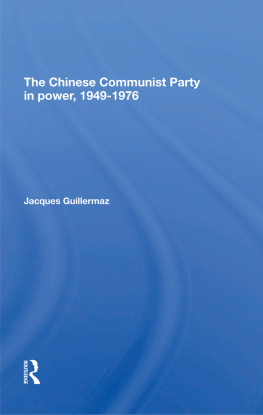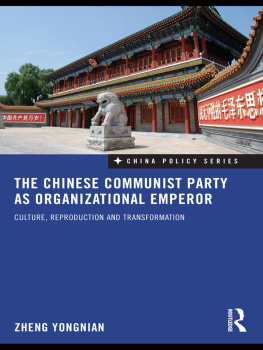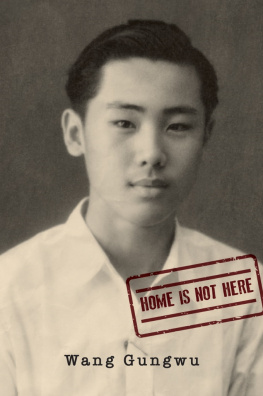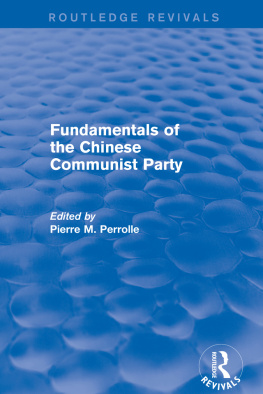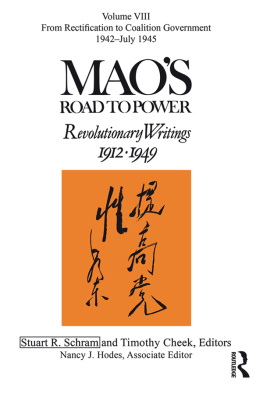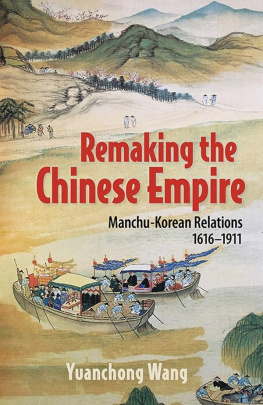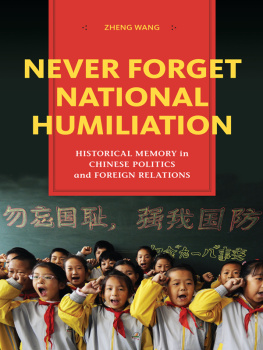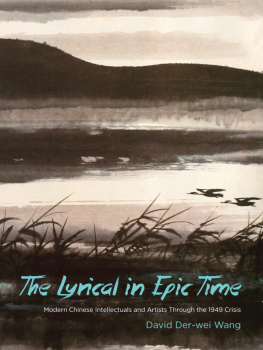Wang Shiwei and "Wild Lilies"
The painting on the cover of this book was specially prepared and dedicated to Ms. Dai Qing by Huang Yong yu, the world-renowned Chinese artist. The poem in the painting reads:
Perhaps in a hundred years all sorrow shall be diminished, but at present, I am embedded in great sorrow.
Wang Shiwei and "Wild Lilies"
Rectification and Purges in the Chinese Communist Party 1942-1944
Dai Qing
Edited by David E. Apter and Timothy Cheek
Translated by Nancy Liu and Lawrence R. Sullivan
Documents compiled by Song Jinshou
An East Gate Book
First published 1994 by M.E. Sharpe
Published 2015 by Routledge
2 Park Square, Milton Park, Abingdon, Oxon OX14 4RN
711 Third Avenue, New York, NY 10017, USA
Routledge is an imprint of the Taylor & Francis Group, an informa business
Copyright 1994 Taylor & Francis. All rights reserved.
No part of this book may be reprinted or reproduced or utilised in any form or by any electronic, mechanical, or other means, now known or hereafter invented, including photocopying and recording, or in any information storage or retrieval system, without permission in writing from the publishers.
Notices
No responsibility is assumed by the publisher for any injury and/or damage to persons or property as a matter of products liability, negligence or otherwise, or from any use of operation of any methods, products, instructions or ideas contained in the material herein.
Practitioners and researchers must always rely on their own experience and knowledge in evaluating and using any information, methods, compounds, or experiments described herein. In using such information or methods they should be mindful of their own safety and the safety of others, including parties for whom they have a professional responsibility.
Product or corporate names may be trademarks or registered trademarks, and are used only for identification and explanation without intent to infringe.
Library of Congress Cataloging-in-Publication Data
Tai, Ch'ing, 1941
[Wang Shih-wei y "Yeh pai ho hua". English]
Wang Shiwei and "Wild lilies": rectification and purges in the Chinese Communist Party, 19421944 / Dai Qing; edited by David E. Apter and Timothy Cheek; translated by Nancy Liu and Lawrence R. Sullivan; documents compiled by Song Jinshou.
p. cm.
Translation of: Wang Shih-wei y "Yeh pai ho hua."
"East gate book."
Includes bibliographical references and index.
ISBN 1-56324-256-7 (pbk.)
1. Wang, Shih-wei, 19061947. 2. Chung-Kuo Kung ch'an tangDiscipline.
I. Apter, David Ernest, 1924
II. Cheek, Timothy.
III. Sung, Chin-shou. IV. Title.
JQ1519.A5T16213 1993
324.251'075dc20
93-34022
CIP
ISBN 13: 9781563242564 (pbk)
FOR LIU YING
AND THE SPOUSES OF ALL PERSECUTED PERSONS IN CHINA
"Don't cry. Don't laugh. But please do understand."
Spinoza
"I don't agree with what you say, but I'll fight to death to protect your right to say it."
Voltaire
"The faults of a gentleman are just like the eclipses of the sun or the moon. If he has faltered, everyone sees it. When he corrects his ways, all will respect him."
The Analects
Contents
David E. Apter and Timothy Cheek
by
Wang Shiwei
by
Wang Shiwei
Tang Tianran
Compiled and Introductions by
Song Jinshou
WangShiwei
WangShiwei
WangShiwei
WangShiwei
WangShiwei
WenJize
Yang Shangkun
Section 3 [omitted]
Liu Ying
In translating Dai Qing's Wang Shiwei and "Wild Lilies " we have tried through minimal editing to retain Dai Qing's original, if somewhat disjointed, style. Thus there is considerable overlap between the book and the documents she frequently quotes. Ms. Dai's quixotic style of sudden asides on related issues with quick returns to the main narrative may also occasionally confuse the reader. Finally, we have followed Dai Qing in offering few explanatory notes, generally avoiding elaborations on the many subtleties of the text. This is a style generally appreciated by Chinese readers, which led us to offer as literal a translation as possible.
It is unfortunate that much of Dai Qing's biting sarcasm may be lost on those not intimately acquainted with China's current political and journalistic culture, a problem exacerbated by the usual difficulties of rendering political Chinese into English. The word comrade (tongzhi) in Dai's use seems innocent enough, but when applied to Wang Shiwei's accusers, like Kang Sheng and Hu Qiaomu, the intent is quite sarcastic and scornful.
Other examples abound throughout the text.
The endnotes, bibliography, supplement, and appendixes (A and B) to the book are Dai Qing's. The translators and editors have added only the explanatory footnotes indicated in the text by asterisks (*), Thanks to Professor Timothy Cheek for his assistance in this translation; to Professor David E. Apter for acquiring this most valuable manuscript while in China and for organizing a colloquium "On Revolutionary Intellectuals: The Case of Wang Shiwei," Whitney Center for the Humanities, Yale University, November 13-14, 1992; to Professor Anthony Saich for permission to use, with slight modifications, his translation of Wen Jize's "Diary of a Struggle"; and to Mr. Song Jinshou of the CCP Organization Department who compiled many of the documents and composed the introductions in . The translators also wish to thank Professor Harriet C. Mills, University of Michigan, for her generous assistance in translating and editing critical parts of the manuscript. Finally, we are all indebted to Ms. Dai Qing, whose tenacity and search for the truth has made this a most enriching, though often sobering, enterprise.
Nancy (Yang) Liu, Columbia University
Lawrence R. Sullivan, Adelphi University and
the East Asian Institute, Columbia University
After hurrying day and night to Shiyan City, Hubei Province, two cadres from the People's Republic Public Security Department announced to the elderly woman that they had been looking for the "Decision on Rehabilitation" which restored the word comrade (tongzhi) to her long-dead husband.
The medium-sized city known for its automobile industry where Liu Ying (Wang Shiwei's widow) resides.
Hearing the appellation tongzhi, Liu Ying, now eighty-five years old, could not hold back her tears. That was 1991.
It had been forty-nine years since "comrade" had been struck from her husband's name, and it had been forty-three years since her husband's head had been removed as a result of losing that appellation.
A sum of moneyten thousand yuancame along with the rehabilitation. Liu Ying was at a loss trying to figure out what the money was for and how the authorities had decided on this amount.


